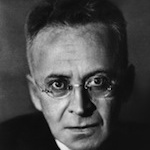Staged during the centenary of the armistice and drawing numerous parallels to the media climate of today, the poignancy of the Last Days of Mankind is unquestionable. With the original satirical work by Karl Kraus deemed ‘unstageable’, directors John Paul McGroarty and Yuri Birte Anderson take Patrick Healy’s translation and perform some 20 scenes, featuring and sustained by original music from The Tiger Lillies. Martyn Jacques’ wistful yet darkly comedic narration provides an essential strand which holds the vignettes together. The directors emphasise the role of the media in perpetuating the conflict, building nationalism and sensationalising the war. Theatre companies from Germany, Poland, Serbia, Ukraine, Ireland and France join the Leith Theatre to present a truly European production.
 Kraus amalgamates news articles, political speeches and snippets of conversations of Viennese civilians overheard in the cafes to chronicle the First World War, with a focus on its destruction and apparent absurdity. Comparisons are drawn between the experiences of the rich and poor, soldiers and civilians; in one particularly gruesome scene, the rich eat coins while the poor look on, while in the second act the public eat strips of newspaper as though empty words and propaganda can nourish them. The final scenes of the play are perhaps the most effective, with expressionist, distorted movement emphasising the senselessness of war. Conveying the atrocity of war through movement is one of the great strengths of the play, with the expressive, grotesque movements of the civilians and soldiers as though they are puppets creating a darkly comedic feeling.
Kraus amalgamates news articles, political speeches and snippets of conversations of Viennese civilians overheard in the cafes to chronicle the First World War, with a focus on its destruction and apparent absurdity. Comparisons are drawn between the experiences of the rich and poor, soldiers and civilians; in one particularly gruesome scene, the rich eat coins while the poor look on, while in the second act the public eat strips of newspaper as though empty words and propaganda can nourish them. The final scenes of the play are perhaps the most effective, with expressionist, distorted movement emphasising the senselessness of war. Conveying the atrocity of war through movement is one of the great strengths of the play, with the expressive, grotesque movements of the civilians and soldiers as though they are puppets creating a darkly comedic feeling.
The Tiger Lillies provide an essential accompaniment, complimenting the satire with their original songs and macabre appearance. The vignettes are tied together by the lilting piano and accordion lines of Martyn Jacques, emotively accompanied by the band. The occasional, unfamiliar sounds of the saw and theremin add an eeriness and sense of unease. Jacques acts his part as narrator and musical director with intensity and wryness.
The vivid projections add to the immersive feeling of the set, and convey the media flurry alongside the degradation of the city as the war progresses. The filmed footage of the First World War speaks for itself – there is no way to portray the horrors of the First World War on stage, but the Last Days of Mankind conveys an overall grotesqueness, a sense of futility and benefits from having an expressionist take on the action.
While the space could feel cavernous, the actors interact with the whole area and the Leith Theatre feels like the perfect setting for the performance as it’s faded grandeur and history create the feeling it has been touched by the action being played out on stage. As the first play to be shown in the theatre for over 20 years, itself touched by the destruction of war, the setting perfectly compliments the sad cabaret.
While at times it can be difficult to understand parts of the text, this almost contributes to the overall idea of misunderstanding the rumour mill. However, there are moments where more clarity would have been beneficial as the potency of some words and lyrics were lost by lack of clarity and issues with microphones.
Kraus’ epic is performed as a fluid work with a sense of urgency. While some scenes carry more weight than others, this fades into relative unimportance when paired with the movement of the company and drawn together by the music of the Tiger Lillies. Indeed, the music is the essential thread which, combined with the narration by Jacques, ties the play together. The futility of war, the senselessness of mankind’s destruction of itself and the warping of events by the endless public appetite for news are all clearly portrayed. The play opens with the musing that the war was started with just a paragraph, and the sentiment is a stark reminder of the power of words.
- Saint Frances (2020) - 3rd July 2020
- Anthropocene: The Human Epoch (2019) - 2nd July 2020
- Brotherhood (2019) - 11th October 2019











